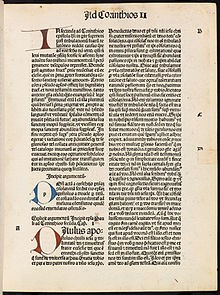Session 12 - 2 Corinthians
Author
Paul and Timothy. The letter tells us about Paul's life and the things that he did. No other letter that he wrote has so much information about him.
Timothy was well-known to the churches in Achaia, where Corinth was located.
Early church leaders such as Polycarp (156 A.D.) confirm that Paul was the author.
Date of Composition
Around 57.

II Corinthians from a 1486 Latin Bible
Purpose and Audience
After Paul's initial response to sin in the church at Corinth, most of them had changed their ways. However, there was still factionalism; some still opposed Paul. They claimed that he was not a powerful person, so he no real authority (1:15-17). He could write powerful letters, but he was not such a great speaker (10:10; 11:6). He did not look attractive. He had some kind of ailment (10:10; 12:7). He refused to accept payment from them for his Apostolic work (11:7-9; 12:13); the great philosophers always lived off income from their disciples. These false apostles claimed that they were better than Paul. Perhaps they queried his credentials because he was not one of the original twelve. We cannot be sure who they were. In 11:21-24, Paul refers to "Hebrews, Israelites, Christ's servants..." Perhaps the false apostles said that they were Christian apostles. (That happens today - watch out for self-labelling.) However, they wanted both Jews and non-Jews in the church to obey the laws of Moses. So they preached a "different Gospel"; their message was not really God's good news.
Paul was uncompromising:
"... they preach a different Jesus than the one we preach, or a different kind of Spirit than the one you received, or a different kind of gospel than the one you believed." (11:4)
⇒ Most cults fail the test of authenticity in these three critical areas.
It is one thing to proclaim Christ to unbelievers; but how sad when opposition comes from those professing to be Christians.
There were also still some people in the Corinthian church who had not repented of their unchristian behavior (12:20-21).
On a positive note, Paul found the Corinthians had received his "severe" letter well. He was overjoyed to learn from Titus that the majority had repented of their rebellion against him (2:12-13; 7:5-9). He encourages them for this in an expression of genuine love (7:3-16). Paul also takes advantage of the letter to vindicate his apostleship, as some in the church had questioned his authority (13:3).
Literary Style and Structure
This rich letter follows at least two others, including what we know as 1 Corinthians.
Paul's introduction of himself as an apostle is both familiar and necessary because he was held in low regard among some of the Christians in Corinth. They had to remember and recognize his apostolic credentials. Paul was not an apostle by the decision or desire of any man. His ministry was according to the will of God. Even if some of the Corinthian Christians held him in low regard, it did not diminish his standing as an apostle called by God.
It is remarkable (to modern ears) that Paul freely calls the Corinthian Christians "saints", considering their many problems. Churches often use the term in a different way today, applying it to the "super-spiritual" who have been canonized in high liturgy churches, instead of those who are simply "set apart" (where the word comes from) by a relationship of trust in Jesus Christ.
Paul explains the nature of his ministry. Triumph through the power and work of Christ and sincerity in the sight of God were the hallmarks of his work among the churches (2:14-17). He compares the glorious proclamation of the righteousness of Christ to the "ministry of condemnation" which is contained in the Law (3:9) and declares his faith in the validity of his ministry in spite of persecution (4:8-18). Chapter 5 outlines the basis of the Christian faith - a brand new nature (v. 17) and the exchange of our sin for the righteousness of Christ (v. 21).
In Chapters 6 and 7 Paul defends himself and his ministry, assuring the Corinthians yet again of his sincere love for them and exhorting them to repentance and holy living. In chapters 8 and 9, he encourages the believers to follow the examples of the brothers in Macedonia and extend generosity to the Christians in Jerusalem who are in need. He goes on to teach them the principles and rewards of generous giving, based on the example of Jesus Christ.
Paul ends his letter by reiterating his authority among them (chapter 10) and concern for their faithfulness to him in the face of opposition from the false apostles. He calls himself a "fool" for having to reluctantly boast of his qualifications and his suffering for Christ (chapter 11). He ends the epistle by describing the vision of heaven he was allowed to experience and the "thorn in the flesh" he was given by God to ensure his humility (chapter 12). The last chapter contains his exhortation to the Corinthians to examine themselves to see whether what they profess is reality, and ends with a benediction of love and peace.
Throughout the letter Paul describes his burdens and experiences, which include being beaten, imprisoned, stoned, and shipwrecked, encountering robbers, and being weary, sleepless, hungry and unclothed. He offers hope to his correspondents, reminding them of our Heavenly Father, who comforts us, "that we may be able to comfort those who are in any trouble, with the comfort with which we ourselves are comforted by God" (1:4). God has "sealed us and given us the Spirit in our hearts as a guarantee" (1:22).
Reconciliation
Do you ever feel misunderstood? False apostles had denigrated Paul's reputation and enticed the Corinthian believers to doubt his sincerity, his message and even his God-given apostleship. But instead of reacting with anger, Paul reveals his humility and generosity as he seeks to build bridges between himself and the church, expressing his love for them, his concern for their spiritual wellbeing, and the need for them to have confidence in his apostleship.

Reconciled in Christ
Key Themes
God's Comfort
"God is our merciful Father and the source of all comfort. He comforts us in all our troubles so that we can comfort others. When they are troubled, we will be able to give them the same comfort God has given us." (1:3, 4; also 5-8)
The letter opens with comfort and ends in comfort; in-between we have Paul's testimony, how he was battered, shipwrecked, persecuted and stripped (6:5), all in the cause of Christ. Paul tells us of his sufferings, oppressions and his thorn in the flesh. However, the thrust of the book is God's comfort and that in all tribulations we have consolations in Christ. In fact, through sufferings our hearts draw closer to God as He is able to comfort us; suffering in this life is working in us for our good, moulding us into His image.
Paul puts it this way:
"That is why we never give up. Though our bodies are dying, our spirits are being renewed every day. For our present troubles are small and won't last very long. Yet they produce for us a glory that vastly outweighs them and will last forever! So we don't look at the troubles we can see now; rather, we fix our gaze on things that cannot be seen. For the things we see now will soon be gone, but the things we cannot see will last forever." (4:16-18)
Forgiveness is Essential
Given everything that has occurred in the church at Corinth, Paul emphasizes the need for reconciliation; this starts with activeness forgiveness.
"I am not overstating it when I say that the man who caused all the trouble hurt all of you more than he hurt me. Most of you opposed him, and that was punishment enough. Now, however, it is time to forgive and comfort him. Otherwise he may be overcome by discouragement. So I urge you now to reaffirm your love for him. I wrote to you as I did to test you and see if you would fully comply with my instructions. When you forgive this man, I forgive him, too. And when I forgive whatever needs to be forgiven, I do so with Christ's authority for your benefit, so that Satan will not outsmart us. For we are familiar with his evil schemes." (2:5-11).
Don't allow yourself to be side-tracked or ensnared by hurt when others offend you.
We are Living Epistles
Paul describes the true Christians at Corinth as "living epistles."
"Your lives are a letter written in our hearts; everyone can read it and recognize our good work among you. Clearly, you are a letter from Christ showing the result of our ministry among you. This 'letter' is written not with pen and ink, but with the Spirit of the living God. It is carved not on tablets of stone, but on human hearts." (3:2, 3).
If you are a Christian, people will be watching you. For some, the only Bible that they will read is us. The words of the Bible are spirit and life, that is, they work in us and become our life, they are living and powerful; God uses His word to form Christ in us -the word becomes flesh in our lives, we are His witness to our world.

This World or the Next?
"For we know that when this earthly tent we live in is taken down (that is, when we die and leave this earthly body), we will have a house in heaven, an eternal body made for us by God himself and not by human hands." (5:1)
There is a powerful reminder here of the brevity of human life (compared with a tent, set up temporarily) and the longer-term hope that Christians have. Nothing in this world is permanent; we need to focus on eternity.

The Power of God's Love
Have you ever thought about what motivates you? Everyone has different aspirations and drivers, some high minded, others less so. Saul of Tarsus underwent a radical transformation - the zealous persecutor of Christians became a passionate follower of Christ. Later known as Paul (the Greek version of his name), he dedicated his time, energy, and talent to spreading the gospel message. What motivated him to surrender his life wholeheartedly to Christ was Jesus' sacrifice of love. Previously, Paul had opposed all who believed in Jesus as the Messiah. At his conversion, this persecutor of Christians realized that Christ willingly died on the cross because of His love for all mankind. Jesus left His heavenly home, suffered, and died so we might be reconciled to God. Jesus' sacrifice on the cross motivated Paul to tell others about His all-encompassing love.
"Christ's love controls us. Since we believe that Christ died for all, we also believe that we have all died to our old life. He died for everyone so that those who receive his new life will no longer live for themselves. Instead, they will live for Christ, who died and was raised for them." (5:14-16).
Stewardship and Generosity
"You know the generous grace of our Lord Jesus Christ. Though he was rich, yet for your sakes he became poor, so that by his poverty he could make you rich." (8:9)
"Thank God for this gift too wonderful for words!" (9:15).
When we understand how much God has given us it becomes our reasonable response to give of ourselves. Giving is better than receiving because it changes our hearts, helps us deal with selfishness and makes us more like Father God. As we give we reflect His character.
"Remember this - a farmer who plants only a few seeds will get a small crop. But the one who plants generously will get a generous crop. You must each decide in your heart how much to give. And don't give reluctantly or in response to pressure. 'For God loves a person who gives cheerfully." And God will generously provide all you need. Then you will always have everything you need and plenty left over to share with others. As the Scriptures say, 'They share freely and give generously to the poor. Their good deeds will be remembered forever.' " (9:6-9).
Standards and Attitudes in Serving God
"... we don't go around preaching about ourselves. We preach that Jesus Christ is Lord, and we ourselves are your servants for Jesus' sake.... We now have this light shining in our hearts, but we ourselves are like fragile clay jars containing this great treasure. This makes it clear that our great power is from God, not from ourselves". (4:5, 7).
"We live in such a way that no one will stumble because of us, and no one will find fault with our ministry. In everything we do, we show that we are true ministers of God. We patiently endure troubles and hardships and calamities of every kind. We have been beaten, been put in prison, faced angry mobs, worked to exhaustion, endured sleepless nights, and gone without food. We prove ourselves by our purity, our understanding, our patience, our kindness, by the Holy Spirit within us, and by our sincere love. We faithfully preach the truth. God's power is working in us. We use the weapons of righteousness in the right hand for attack and the left hand for defense. We serve God whether people honor us or despise us, whether they slander us or praise us. We are honest, but they call us impostors. We are ignored, even though we are well known. We live close to death, but we are still alive. We have been beaten, but we have not been killed. Our hearts ache, but we always have joy. We are poor, but we give spiritual riches to others. We own nothing, and yet we have everything." (6:3-10)
No compromise with the World
"Don't team up with those who are unbelievers. How can righteousness be a partner with wickedness? How can light live with darkness? What harmony can there be between Christ and the devil? How can a believer be a partner with an unbeliever? And what union can there be between God's temple and idols? For we are the temple of the living God. As God said: 'I will live in them and walk among them. I will be their God, and they will be my people.
Therefore, come out from among unbelievers, and separate yourselves from them, says the Lord. Don't touch their filthy things, and I will welcome you. And I will be your Father, and you will be my sons and daughters' " (6:14-18)
Ambassadors for Christ
"And all of this is a gift from God, who brought us back to himself through Christ. And God has given us this task of reconciling people to him. For God was in Christ, reconciling the world to himself, no longer counting people's sins against them. And he gave us this wonderful message of reconciliation. So we are Christ's ambassadors; God is making his appeal through us. We speak for Christ when we plead, 'Come back to God!' " (5:18-20)
Our Spiritual Warfare
"We are human, but we don't wage war as humans do. We use God's mighty weapons, not worldly weapons, to knock down the strongholds of human reasoning and to destroy false arguments. We destroy every proud obstacle that keeps people from knowing God. We capture their rebellious thoughts and teach them to obey Christ." (10:3-5).
The world is a spiritual battlefield. If we wish to be discerning and relevant Christians in modern age, we need to understand clearly the spiritual nature of the conflict, acknowledge it is real and have a solution that is both Bible-based and effective. We also need to be able to operate with the power of God against the deception and bondage in which so many millions are bound.
The Gospel record includes literal encounters between Satan and Jesus (Luke 4:2-13 is just one). The Apostle John told the early church that the whole world lies under the influence of the Evil One (1 John 5:19). Far from being an overt "evil creature" of comic books, he often transforms himself into an Angel of Light, so that his work is considered benign, attractive even, it is not recognised as inherently evil (2 Corinthians 11:14). Paul declared in his letter to the church at Rome that God would crush Satan under their feet (Romans 16:20).

Christians are engaged in a spiritual warfare, not against people, but "wicked spirits in heavenly places" (Ephesians 6:12). God wants us to live victoriously. The issues, at heart, are not about people, but spiritual enemies.
If we do not know how to deal with spiritual attack, we can end up being blind-sided, discouraged, disempowered and dispossessed. We can miss the real causes of things that occur in our lives.
Spiritual warfare is not based on our own knowledge, strength, wisdom or traditions. It is not a physical conflict (Ephesians 6:12; 2 Corinthians 10:4). Nor is it about personalities, temperaments or the particular traits of people. It is spiritual by nature and requires spiritual weapons. Ephesians 6:11-18 tells us these are: truth, righteousness (right standing and living before God), the Gospel of peace, faith, our salvation, the Word of God and prayer. We need to use these weapons every day of our lives. In addition, we are called, not to be passive, but to "resist" the devil, and are assured that he will flee from us (James 4:7). We have at our disposal the power of God (2 Corinthians 10:4; Psalm 44:5); and the name of Jesus (Philippians 2:10-11). The Holy Spirit helps us to remain alert to what is going on in the spiritual realm we cannot see with our physical eyes.
There are people all around us who are bound by invisible forces they do not understand and cannot defeat. Jesus came to set captives free (Luke 4:18; Acts 10:38). Let's take up the weapons the Holy Spirit has given us and work with Him, through power evangelism and anointed prayer, to defeat the enemy and proclaim Christ the victor.
We are equipped to wage warfare against spiritual strongholds in individuals, communities, cities and even nations. Through our faith we are empowered to wage an effective warfare, gain the victory (1 John 5:4b) and see lives transformed.
We are Being Changed
One of the enduring themes of 2 Corinthians is personal change. We are inadequate. We are as weak as jars of clay. But we have an eternal treasure in us. We are foolish in the eyes of unbelievers, but we are God's ambassadors. The simplicity and human illogicality of our faith is scorned by the world, but we represent God to that world, and model the new relationship He wants with humankind. They don't get it, but we do; we have new sight and clarity, our hard hearts and spiritual blindness have been taken away, just by turning to him and believing in Christ. When the Holy Spirit is present and Lord of our lives we experience freedom and transformation into His image (3:12-18; 4:).
For Reflection:
- "... it was your enthusiasm that stirred up many of the Macedonian believers to begin giving" (9:2). Is this your attitude to giving to God's work and His people?
- What is really important to you? (4:16, 5:7).
- Where is your hope? This life or the next? (4:16-18; 5:1-10).
- Does the love of God control you? (5:14)
- Who sets the priorities in your life? "He died for everyone so that those who receive his new life will no longer live for themselves. Instead, they will live for Christ, who died and was raised for them." (5:15)
- Do you seek to live in such a way that no one will stumble because they are watching you, and no one will find fault with your ministry? In everything you do, do you show that you are a true servant of God?
- Do you serve God regardless of whether people honour or despise you, whether they slander or praise you? (6:8).
- "Give according to what you have, not what you don't have." (8:12). Many people promise that they will become generous when they have more; the test is what we do with what we have now.
- The grace of God is enough for us (12:9).
- Paul's "thorn in the flesh" shows us that, sometimes, God's answer to our prayers is "No".
- "When I am weak, then I am strong" (12:10). Make that your approach.
- "Examine yourselves to see if your faith is genuine. Test yourselves." (13:5)
"Anyone who belongs to Christ has become a new person.
The old life is gone; a new life has begun!" (5:17)
The following is often used as a "benediction" (a blessing at the end of a church service):
"May the grace of the Lord Jesus Christ, the love of God, and the fellowship of the Holy Spirit be with you all." (13:14)




